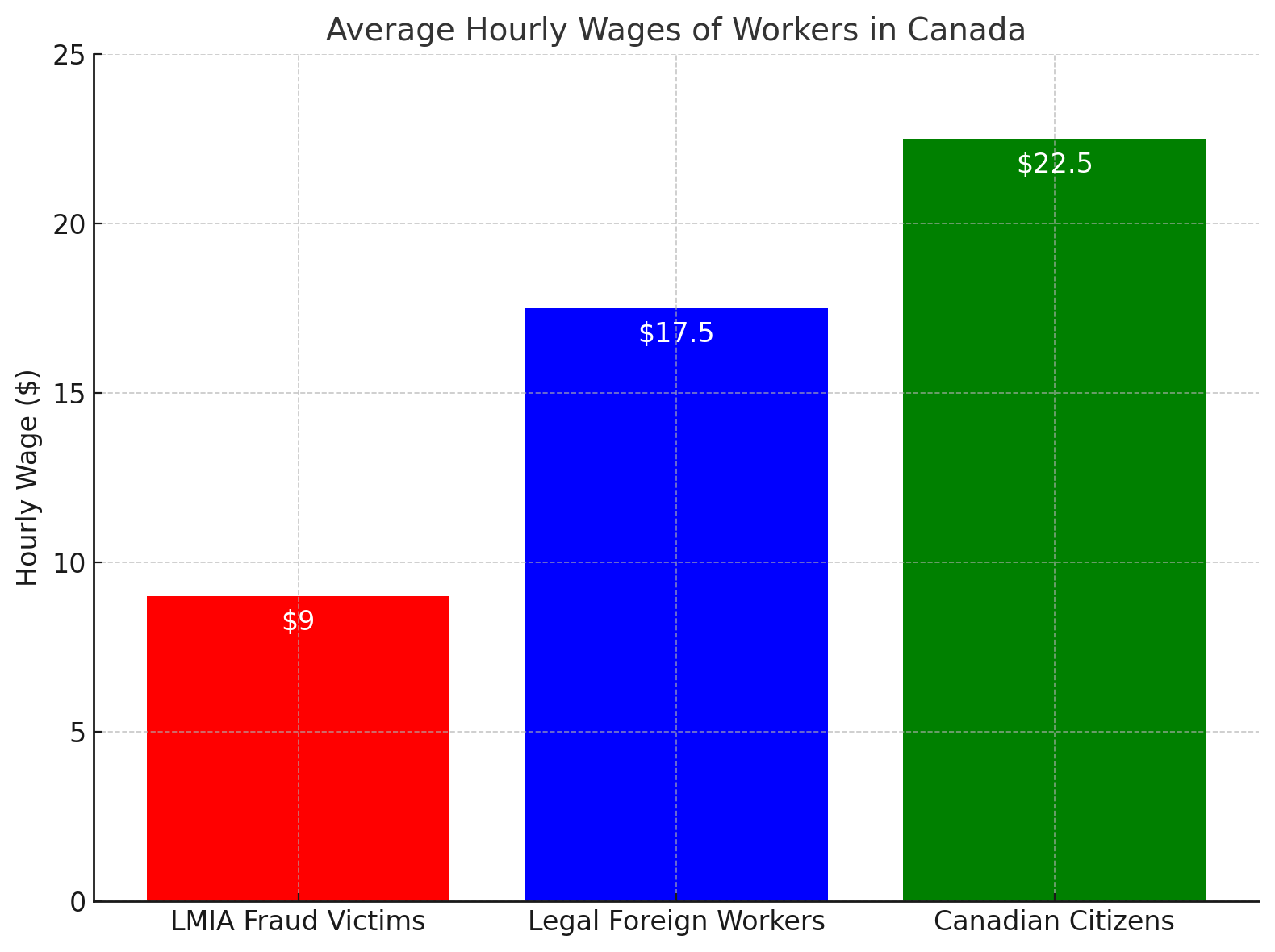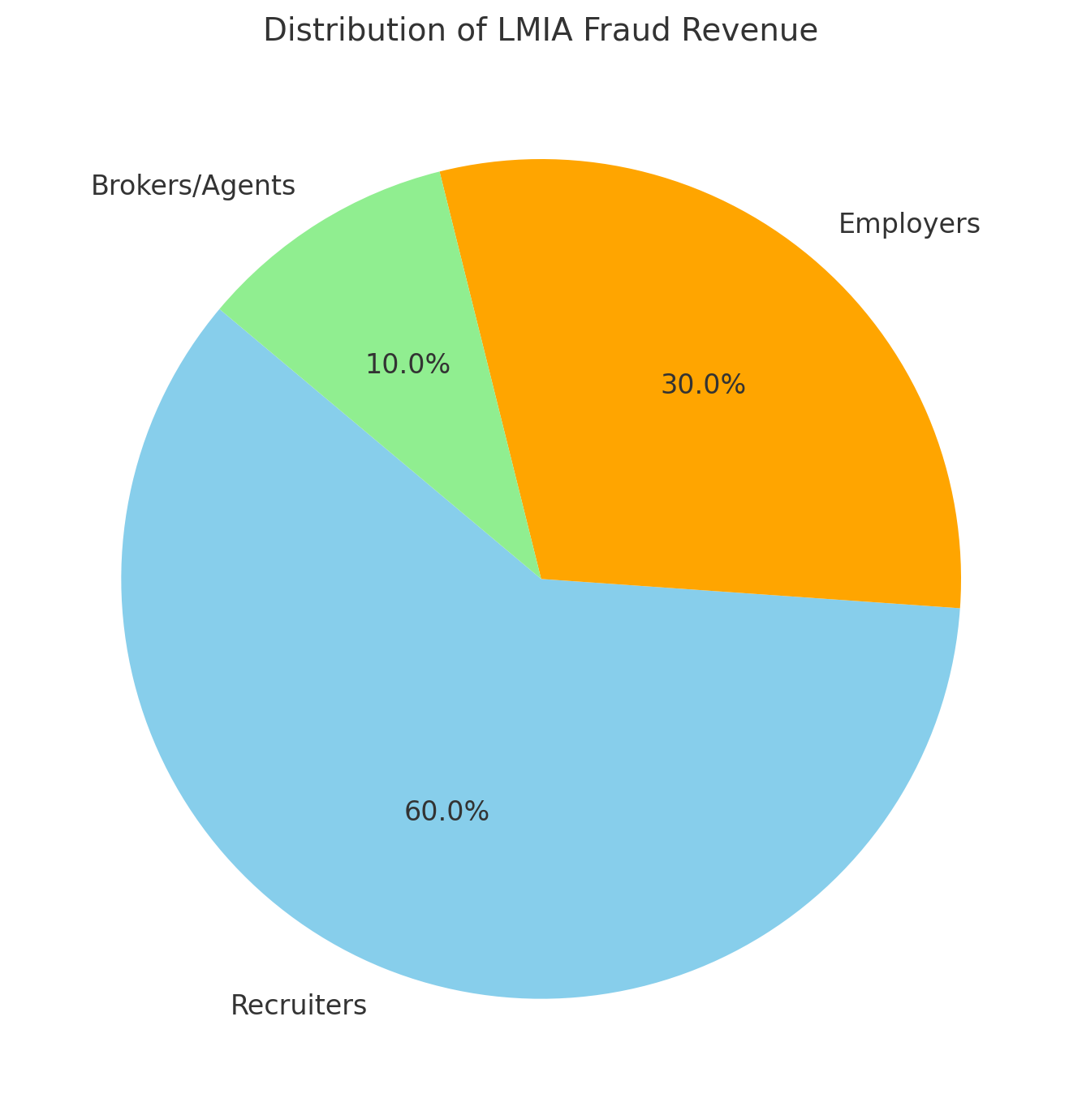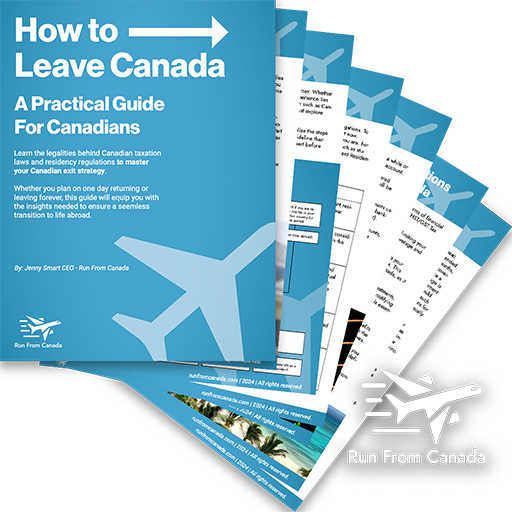Around the world, people explain Canada as a land with gold filled streets. Although if this was true, we wouldn’t see immigrants paying for jobs in Canada.

With promises of high standards of living, economic stability, and job opportunities, Canada has long been a top destination for immigrants seeking a better future.
But beneath this enticing narrative lies a darker reality that has left many disillusioned: a labour market so broken that immigrants are increasingly paying for jobs in Canada.
A Broken Labour Market – Why People Pay for Jobs in Canada
Canada’s labor market has been under scrutiny in recent years. While the country tries to tell tales of low unemployment rates, the reality for almost all workers, especially immigrants and young adults, is far more troubling.
Recent data from December 6th 2024, the morning we are writing this article showed that the Canada-wide unemployment rate jumped to 6.8% the highest it has been since 2014. With certain cities like Toronto and Edmonton clearing 8%+ unemployment.
That’s also not including specific parts of our populations such as new immigrants and young Canadians who are currently battling over 10% unemployment rates in this country. We predict this is also much higher than the official numbers say due to the changes in how Western governments count unemployment and the influx of government job hiring we’ve seen in Canada.
Any who, the cracks in the Canadian employment system have now allowed a dangerous black market to flourish.
One where jobs are sold to desperate newcomers as a way to flout the traditional Canadian immigration system and for job creators, franchise owners, and business people to make a quick buck.

These aren’t rare occurrences or isolated scams. People are paying exorbitant fees, sometimes as high as $40,000, just to secure employment that strengthens their immigration applications.
These jobs, often tied to the Labour Market Impact Assessment (LMIA) process (explained in above video), are critical for many immigrants trying to obtain a temporary work permit, permanent residency, or other legal statuses in Canada.
According to reports, fraudulent LMIA documents are being sold openly, often targeting vulnerable individuals overseas. A CBC investigation highlights the alarming scale of this fraud, revealing how deeply entrenched this issue has become in Canada’s immigration system.
How Paying for Jobs In Canada Became a Real Thing
The growing issue of immigrants paying for jobs in Canada is tied to how the country’s immigration system evaluates applicants.
The system heavily prioritizes job offers from Canadian employers as part of pathways to permanent residency or work permits, making employment a critical factor in immigration applications.
This reliance on job offers has unintentionally created vulnerabilities in the system, allowing for widespread exploitation.
Canada’s Immigration Framework: The Role of Job Offers
For many skilled workers, securing a job offer from a Canadian employer is more than just a chance to work—it significantly enhances their chances of obtaining permanent residency or temporary work permits. Programs such as the Express Entry System and the Provincial Nominee Program (PNP) award additional points for valid job offers under the Comprehensive Ranking System (CRS).
To prove a genuine need to hire a foreign worker, employers must submit a Labour Market Impact Assessment (LMIA), a document showing that no Canadian citizen or permanent resident is available to fill the role. While the LMIA is a tool to protect local workers, it has also become a gateway for abuse.
The Exploitation of LMIA Requirements
Unscrupulous recruiters and employers have turned the LMIA process into a lucrative black market. Fraudulent job offers are sold for anywhere between $20,000 and $40,000. These fake offers are often accompanied by falsified LMIA documents, giving the illusion of legitimacy.
According to a 2023 report by Immigration News Canada, LMIA fraud is now a multi-million-dollar industry, with recruiters operating both in Canada and abroad. For immigrants, paying these fees seems like an investment in their future. However, this practice is illegal under Canada’s Immigration and Refugee Protection Act (IRPA), which prohibits charging fees for employment.
Why Immigrants Take the Risk
For immigrants, the stakes are extraordinarily high. The promise of a job offer is not only about immediate employment but also about securing a foothold in Canada. The primary motivations for paying exorbitant fees include:
- Immigration Points Boost: Under Express Entry, a valid job offer can add 50–200 CRS points, potentially making the difference between receiving an Invitation to Apply (ITA) for permanent residency or being overlooked.
- Economic Pressures: Many immigrants come from countries with struggling economies. For them, paying for a job in Canada is seen as a way to escape poverty or political instability.
- Limited Awareness of Rights: A significant number of applicants lack awareness about Canada’s labor laws or their rights as workers, making them easy targets for fraudsters.
- Fear of Repercussions: Once they enter the system, victims fear reporting fraud due to concerns about jeopardizing their immigration applications.
The Harsh Reality for Immigrants
Despite paying tens of thousands of dollars, the reality for many immigrants in Canada often fails to meet expectations. Instead of finding security and opportunity, they face:
- Exploitation in the Workplace: Many immigrants are forced to work long hours for below-minimum wages or no wages at all to repay the debts incurred for their job offers.
- Limited Mobility: Workers tied to fraudulent LMIA offers cannot easily switch jobs without risking their immigration status.
- Emotional and Financial Stress: The financial burden of paying for fake job offers leaves many in a precarious position, unable to afford basic necessities or send money to family back home.
Impact on the Canadian Labor Market
The issue of immigrants paying for jobs doesn’t just harm workers—it also has broader implications for the Canadian labor market. Fraudulent LMIA applications undermine the integrity of the system, disadvantage honest employers, and perpetuate unfair labor practices.
- Economic Inefficiencies: Fraud distorts wage rates, as exploited workers often accept lower wages, putting downward pressure on overall earnings in affected sectors.
- Reputation Damage: Canada’s image as a fair and equitable destination for immigrants is tarnished, potentially discouraging highly skilled workers from applying.
Canada’s Created a Slave Worker Boom – Life in Labour Servitude
Paying for jobs in Canada comes with a steep price, far beyond the initial monetary cost. Immigrants who secure jobs through fraudulent means often find themselves trapped in exploitative conditions. This Labour Trafficking is often done by their own people.

Many are locked into jobs with little to no bargaining power. The fear of jeopardizing their immigration status keeps them from speaking out. Some are paid less than minimum wage, while others receive no pay at all, as their earnings are used to repay the debts they owe to their employers.
This creates a vicious cycle of labor servitude. Workers are stuck in exploitative conditions, with fewer rights and little legal recourse. Meanwhile, their employers profit from their vulnerability.
The impact of LMIA fraud extends beyond individual workers. It undermines the integrity of Canada’s labor market, leaving honest workers and businesses at a disadvantage.
The Price of Fraud: Life in Labor Servitude
LMIA fraud has not only entrapped immigrants in exploitative conditions but has also skewed wage dynamics in Canada. Victims of job scams typically earn far less than legal foreign workers or Canadian citizens. A study by the Migrant Workers Alliance for Change in 2022 revealed that:
- Fraud Victims’ Wages: Many fraud victims work for $6–$12/hour, often below the provincial minimum wage. Some receive no wages at all, as they are forced to repay their “employers” for fraudulent job placements.
- Legal Foreign Workers’ Wages: Legal foreign workers typically earn between $15–$20/hour, depending on their occupation and province.
- Canadian Citizens’ Wages: Citizens working in similar jobs earn approximately $20–$25/hour, benefiting from full labor protections.
These wage discrepancies highlight the economic cost of labor servitude. Exploited workers are unable to demand fair pay or working conditions, and their presence in the labor market undermines wage standards across industries.
Economic Impact of Paying for Employment in Canada
The widespread nature of this fraud affects more than the workers themselves. Employers who exploit LMIA fraud victims save on labor costs, creating unfair competition with businesses that comply with labor laws. Moreover, the unpaid taxes and suppressed consumer spending by underpaid workers strain Canada’s economy.

Figure 1: Comparing the hourly wages of 3 working groups in Canada: LMIA fraud victims, legal foreign workers, and Canadian citizens.
- LMIA Fraud Victims: Victims of job fraud earn an average of $9/hour, which is significantly below Canada’s minimum wage (ranging from $15–$16/hour in most provinces). In many cases, they are forced to forgo wages entirely to repay fraudulent job fees.
- Legal Foreign Workers: This group earns an average of $17.50/hour, typically matching or slightly exceeding minimum wage standards. They benefit from some labor protections, but disparities with Canadian workers persist.
- Canadian Citizens: Citizens working in similar jobs earn an average of $22.50/hour, reflecting better access to legal protections, union representation, and the ability to negotiate higher wages.
The figure clearly highlights how LMIA fraud exacerbates economic inequality, harms vulnerable workers, and disrupts Canada’s labor market integrity by suppressing wages for natives while making jobs scarcer.
The Rise of the Black Market for LMIA Jobs
The black market for LMIA jobs is thriving, with recruiters and employers exploiting loopholes in the system. According to Immigration News Canada, fraudulent job offers have become a multi-million-dollar industry. Desperate applicants are being lured into paying exorbitant fees for fake or exploitative job opportunities, creating a cycle of exploitation that benefits unscrupulous middlemen and employers.
Canada’s immigration system, designed to attract skilled workers and fill labor shortages, has inadvertently created an environment ripe for abuse. And while law enforcement agencies have cracked down on fraudulent recruiters, the problem persists, raising questions about whether the system is broken beyond repair.
Recent reports and studies show that the black market for LMIA jobs is estimated to generate tens of millions of dollars annually. It makes sense when fake job offers often cost between $20,000 and $40,000, with some cases exceeding even these amounts for better roles.
This scam has been around in Canada for a long time. A 2023 study by the Migrant Workers Alliance for Change found that 1 in 4 temporary foreign workers reported paying illegal fees for jobs or visas. We predict that this number is much higher due to Canada’s tight labour market.
Furthermore the growing prevalance of LMIA Fraud is also caused by the payouts it provides to all conspirators in the fraud. Here’s a breakdown.

Figure 2: Distribution of LMIA Fraud Revenue highlighting how profits from LMIA job fraud are divided among key players in the black market.
- Recruiters (60%)
- Recruiters dominate the black market, pocketing the largest share of the revenue. They act as intermediaries, connecting desperate immigrants with employers willing to engage in fraudulent schemes. Their extensive networks and deceptive practices make them central to this exploitation.
- Employers (30%)
- Employers benefit significantly, receiving a large cut of the fees while also exploiting the workers for low or unpaid labor. These employers often create fake job offers and submit fraudulent LMIA applications to justify their actions.
- Brokers/Agents (10%)
- Brokers and agents play a smaller role, acting as facilitators who guide applicants through the fraudulent process. They often provide false assurances and documents, taking advantage of immigrants’ lack of awareness.
This visualization paints a grim picture of how LMIA fraud generates profits while perpetuating exploitation. It serves as a stark warning to immigrants and a call for systemic reforms to close the loopholes enabling this thriving black market.
For immigrants considering Canada, these revelations can be a wake-up call. There are better job markets and more transparent opportunities outside Canada. Exploring these alternatives can save potential newcomers from falling prey to these fraudulent schemes.
Finding Better Job Opportunities Outside of Canada
If Canada’s labor market challenges have left you questioning your next move, you’re not alone. We hear it everyday. Canadians and newcomers are exiting the Great White North like never before in search of better job and life opportunities abroad.
If this is on your mind, it may be time to explore other options. Several countries offer vibrant job markets with fairer systems and better opportunities for immigrants. Our guide to six better job markets than Canada highlights some of these destinations.
And if you need some help with your visa or just to learn the steps involved in emigrating outward of Canada, we’ve got your back with the Leaving Canada Guide:

Explore Your Opportunities Abroad
Use the Canadian Exit Guide to see how you can leave Canada to find better opportunities abroad.
In countries like Germany, Australia, and New Zealand, immigration systems are designed to ensure fairness and transparency. These nations offer thriving economies and a more straightforward pathway to residency or citizenship without the rampant fraud and exploitation seen in Canada.
Beyond Jobs: Canada’s Economic Challenges
Job fraud is just one symptom of a broader economic crisis in Canada. From the growing homelessness crisis to the collapse of the middle class, many are questioning whether Canada still offers the opportunities it once promised.
These systemic issues have left workers struggling to make ends meet, pushing more people toward desperate measures like paying for jobs. As the cost of living continues to rise, and housing remains unaffordable for many, the dream of a stable life in Canada is slipping further out of reach.
Protecting Yourself From Job Fraud
If you’re considering working in Canada, it’s essential to protect yourself from fraudulent job offers. Here are some tips:
- Verify the Employer: Before accepting a job, ensure the company is legitimate and has a track record of compliance with labor laws.
- Beware of High Fees: No legitimate job offer in Canada requires you to pay for employment.
- Consult Official Channels: Use official government websites and verified immigration consultants for guidance.
- Stay Informed: Keep up to date with the latest news and warnings about job fraud in Canada to avoid falling victim.
If you’ve already encountered issues in Canada’s labor market or are reconsidering your options, it might be time to explore opportunities abroad.
Launch Your Career Overseas
The global job market is vast, and there’s no reason to limit yourself to Canada. Many countries offer fairer systems and better opportunities for skilled workers. If you’re looking for a fresh start, consider launching your overseas career with our Complete Youth Mobility Visa Guide.
This comprehensive resource can help you navigate the immigration process and find job opportunities that align with your skills and aspirations.
The idea of paying for jobs in Canada is a stark reminder of how broken the labor market has become. For immigrants, the dream of a better life can quickly turn into a nightmare of exploitation and servitude. By staying informed and exploring better opportunities elsewhere, you can avoid falling into these traps and find a path to success that truly values your skills and contributions.
Looking to leave Canada?
Take the country quiz to see where you belong!

Leave a Reply